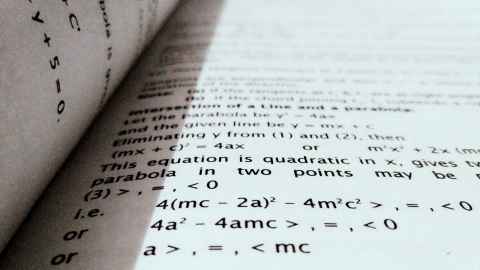Algebra, Geometry and Combinatorics
Our research is mainly in the fields of group theory, representation theory, graph theory, geometry, number theory, and applications. A particular strength is the computational and algorithmic aspects of groups and graphs.

Research topics
These mathematics research topics developed from abstracting observations about counting, arithmetic, algebraic manipulation, and symmetry.
The use of these topics is pervasive in mathematics, with applications in cryptography and the mathematics of social choice.
Algorithms for group theory
This research focuses on the development, analysis and application of high-quality algorithms, to group theory and other areas of computational algebra.
As part of this work, we make extensive use of computational algebra packages.
Elliptic curves, algorithms and public key cryptography
We study the mathematical and algorithmic problems related to public key cryptography and post-quantum cryptography, including elliptic curves, lattices, isogenies, and code-cased cryptography.
Public key cryptography is an extremely active topic of research with significant application in e-commerce and internet security.
In particular, SSL protected communications (such as online shopping or internet banking) use key exchange, while public key digital signatures are used to verify that automatic software updates are not malicious software.
Modular representation theory of finite groups
Representation theory is the study of the various representations of a group. The research focuses on the determination of a group from the knowledge of its p-local subgroups.
We ask questions such as: "What can we say about the group if we know the structure of a Sylow p-subgroup?" and "How many proper p-local subgroups determine the structure of a given finite group?"
Simple games and secret sharing schemes
A simple game is a model of collective decision-making in which some groups are winning and can engage in a certain activity (e.g pass a bill), while other groups are losing and cannot engage in the activity. The United Nations Security Council is an example of a simple game.
A secret sharing scheme divides the secret 'S' into shares - one for every user - in such a way that allows 'S' to be easily reconstructed by any authorised subset of users. An unauthorised subset of users can extract absolutely no information about 'S'.
Symmetries of discrete objects
Our research focuses on discrete objects with a high degree of symmetry under particular conditions, such as graphs, networks, maps, tessellated surfaces, polytopes and 3-manifolds.
Typically, symmetries form a group that can be presented in a particular form, associated with the kind of object being considered. Examples are analysed in terms of the object itself, the group, or the ambient space.
Our researchers
Associate Professor Jianbei An
- Modular representation theory
- Finite group theory
Distinguished Professor Marston Conder
- Combinatorial group theory
- Computational group theory
- Symmetries of graphs, maps, polytopes and surfaces
Professor Steven Galbraith
- Number theory
- Cryptography
Dr Florian Lehner
- Graph theory and group theory
Professor Eamonn O'Brien
- Group theory
- Computational algebra
Dr Jeroen Schillewaert
- Geometric group theory (Tits buildings)
- Combinatorics including finite geometry
Professor Arkadii Slinko
- Applied combinatorics
Dr Gabriel Verret
- Symmetries of discrete objects
Notable visitors
The Department of Mathematics hosts many international visitors. Some of our notable visitors in the field of algebra and combinatorics include:
- Professor Laci Babai (University of Chicago)
- Professor Martin Liebeck (Imperial College)
- Professor Hendrik Van Maldeghem (Ghent University)
- Dr Uri Onn (Australian National University)
- Associate Professor Anne Thomas (University of Sydney)
- Professor Christopher Voll (University of Bielefeld)
- Professor James Wilson (Colorado State University)